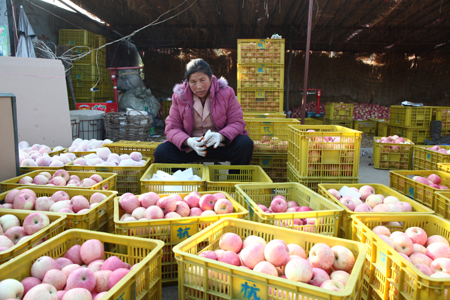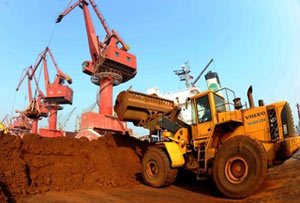Biz Unusual
Fruits give farmers juicy bite of profits
By Duan Yan in Qixia and Hu Yongqi in Beijing (China Daily)
Updated: 2010-11-04 15:52
 |
Large Medium Small |
|
 |
|
A retailer categorizes apples before packaging them for sale in a market in Qixia, Shandong province, on Oct 27. [Photo/China Daily] |
Lu Guoqi could not stop smiling. Sitting behind the bars of a tricycle loaded with apples, the grocer has been making a tidy profit in recent weeks.
"The price has never been so high," said the 58-year-old from Qixia in Shandong province. This time last year, he was making just 2.1 yuan (31 US cents) for every jin (a Chinese measurement equal to 500 grams) of apples. Today, the price is 3.1 yuan.
Apples are the latest in the growing number of fruits and vegetables that have seen sudden price hikes over the last 12 months, with others including garlic, mung beans and cabbages.
Although many of the voices in the marketplace and in the media are laying the blame on opportunist speculators, experts say their involvement is only one of the factors driving up prices.
|
|||||||
Yet, regular wholesale buyers say the fruit has been snapped up quicker than usual this year, leaving them with slim pickings.
Sun Shixian, who has been trading apples since 1997, looked far from happy as he held a basket of bruised apples that had cost him 2 yuan a jin. "This kind of apple was always considered 'damaged goods' but now the market standard has changed," he said.
Officials with Qixia's fruit industry bureau attributed the drop in quality to cold weather in last spring, which also affected yields, with production falling by 100,000 tons. (Although the Shaanxi authorities deny annual apple yields have fallen, buyers claim they are down at least 30 percent.)
Droughts and floods this year in South China have also hit growers, reducing their output, which is also contributing to the demand for alternatives.
"A shortage of other fruits means more buyers turn to apples," said Sun. "More disasters next year will likely push prices even higher."
 Special Coverage: Rare as it is
Special Coverage: Rare as it is
